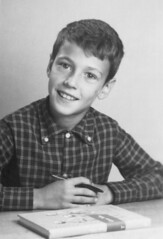This weekend, I'll head to the east coast to Discovery Education's "Beyond the Textbook" forum to discuss -- as the name of the event suggests -- the future of textbooks. I'm quite honored to have been asked to participate, particularly as the last time I wrote at length about the topic I spat nails. (That's something that gets you stern phone calls from corporate headquarters, in my experience.)
When thinking about the move "beyond the textbook," my hope is that the future involves more of the prepositional part of that phrase and less on the object. In other words, more "beyond," less "textbook." See, even when we add the adjective "digital" to the textbook, I don't think we've done much other than convert the print to PDF -- oh wait. That was the last time I wrote about textbooks. There was also nail-spitting.
Oh sure, digital textbooks can offer a number of things: "interactivity," "adaptivity," "editability," "sharability," "social integration," and so on. (All in scare quotes because I think we need to interrogate exactly what we mean by those points, those selling points that publishers are now touting.) Indeed as David Wiley argued last week at SXSWedu, the textbook publishers may be willing to walk away from their stringent control over the market for print as they are ready to "double down on digital."
I'm happy to "double down" on digital content too. But if you call it a textbook then, not so much. I think we can do better now that the constraints of the printed page no longer bind us (ugh, bad pun).
David Warlick, who'll also be in attendance at the forum, has a blog post where he's asking for people to complete the simile "The learning device of the future will look more like a ____." Wes Fryer has offered his suggestion: "palantir." (An awesomely geeky answer.) I encourage you to fill in the blank on David's post too. He's collected some of the early responses in a word cloud -- how very interesting to see that "expert" is a dominant answer. After all, that is why we've historically turned to textbooks -- they promised expertise when the classroom teacher might not have had it, when the student couldn't otherwise find it, when expertise was controlled and legimated by publishing houses and institutions.
So, let's think "beyond."
Me, I hope the learning device (and I would also question "device" here) of the future looks more like the open Web -- that is, connections between learners and links between hypertext documents and data that is never bound and is always changing. That's what I'd like to see in lieu of a focus on textbooks -- helping learners be able to navigate the rich resources that are available for them online, chart their own paths to discovery, one that isn't restricted or predetermined by chapter headings and section quizzes and study guides.
But as this pre-event post should indicate to you all, I am definitely interested in what others have to say...
Photo credits: Kim Scarborough
